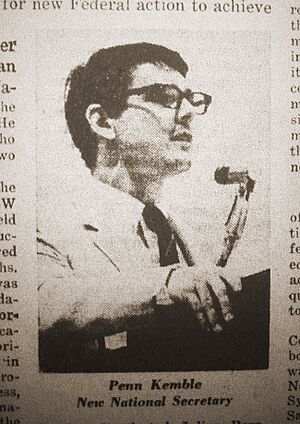Penn Kemble facts for kids
Richard Penn Kemble (born January 21, 1941 – died October 15, 2005), known to many as "Penn," was an American activist who worked for political and social change. He helped start a group called Social Democrats, USA. Penn strongly believed in democracy and supported labor unions in the United States and around the world. He was active in important movements like the civil rights movement, the labor movement, and groups that opposed communism.
He also founded organizations such as Negotiations Now! and Frontlash. Later, he led the Committee for Democracy in Central America. In the 1990s, Kemble worked for the government in different roles. He even became the Acting Director of the U.S. Information Agency under President Bill Clinton.
Contents
Biography
Early Life and Activism
Penn Kemble was born in Worcester, Massachusetts in 1941 and grew up in Lancaster, Pennsylvania. He went to the University of Colorado in the early 1960s. There, he helped create a local group for young socialists called the Young People's Socialist League. This group was the youth section of the Socialist Party of America. At college, a professor named Alex Garber, who was a social democrat and against communism, influenced Kemble's ideas.
After college, Kemble moved to New York City. He worked at The New York Times newspaper but was fired. This happened because he refused to cross a picket line during a typesetters' strike. He was also a leader in a civil rights group called the Congress of Racial Equality. Kemble helped organize a peaceful blockade of the Triborough Bridge during busy hours. This protest aimed to show people living in the suburbs what life was like for residents in Harlem.
Political Journey
From the mid-1960s, Kemble was very active in the Young People's Socialist League (YPSL). In 1968, his group won most of the votes in the Socialist Party. He was elected as the National Chairman of the YPSL. This made him a member of the Socialist Party's National Committee. Later that year, he became the National Secretary of the Socialist Party.
Kemble also helped start a group called Negotiation Now!. This group wanted to end the bombing of North Vietnam and find a peaceful solution to the Vietnam War. However, he did not support the idea of the U.S. military leaving Vietnam without an agreement. In 1972, Kemble organized a protest against another group, featuring 76 Vietnamese people on a picket line.
In 1972, Kemble co-founded the Coalition for a Democratic Majority (CDM). This group was made up of moderate Democrats. They disagreed with the more liberal ideas of politicians like Senator George McGovern. Kemble was the Executive Director of CDM from 1972 to 1976. After that, he worked as a special assistant and speechwriter for Senator Daniel Patrick Moynihan until 1979.
Kemble was concerned about the influence of the Communist Party USA and its supporters in the U.S. Peace Movement. He also worried about their role in the National Council of Churches. Because of these concerns, he helped create the Institute on Religion and Democracy.
Working for Democracy Abroad
From 1981 to 1988, Penn Kemble was the President of the Committee for Democracy in Central America (PRODEMCA). This group spoke out against Marxist–Leninist groups in Central America. They especially criticized the Sandinistas in Nicaragua and the FMLN in El Salvador. PRODEMCA also worked to support the Christian Democratic President of El Salvador, José Napoleón Duarte, during the Salvadoran Civil War.
Kemble also argued that the U.S. Congress should provide money to the Nicaraguan Contras. The Contras were fighting against the Sandinistas. He believed this funding would pressure the Sandinistas to negotiate a peace treaty. Kemble was part of a group called the "Gang of Four" who supported the Contras. This group included other social democrats and people who had opposed the Vietnam War. While they supported the Contras, they sometimes disagreed with the Reagan Administration on how to handle things. For example, they wanted to move control of Contra funding from the CIA to the State Department.
Government Roles and Later Years
Penn Kemble supported Bill Clinton's campaign for President. When Clinton became President, Kemble served as the Deputy Director of the U.S. Information Agency in 1993. In 1999, he became the Acting Director of the agency. He was also a special representative for Secretary of State Madeleine K. Albright for an initiative called the Council for a Community of Democracies.
In 2001, President George W. Bush appointed Kemble to the Board of International Broadcasting. He also became the representative for Freedom House in Washington, D.C.. In his final years, he worked hard to support peace efforts in the Middle East. Although he was offered other official positions in the Bush administration, he turned them down. However, Secretary of State Colin L. Powell asked Kemble to lead a group focused on slavery and forced labor in Sudan.
Death and Legacy
Penn Kemble passed away on October 15, 2005, at his home in Washington, D.C. He was 64 years old and had been battling brain cancer for a year. He was survived by his wife, two sisters, and his brother. Throughout his life, Kemble always described himself as a social democrat, meaning he believed in a mix of democracy and social programs.
 | May Edward Chinn |
 | Rebecca Cole |
 | Alexa Canady |
 | Dorothy Lavinia Brown |


